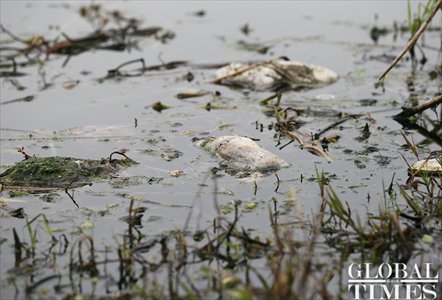Pig pollution shows urgent need to ensure water quality

The country is reeling over news that thousands of floating dead pigs have been found in the Huangpu River, which runs straight through the center of Shanghai and is one of the primary water sources for the city's 23 million inhabitants.
The discovery raises questions about the safety of the area's drinking water. Shanghai officials said they had found no threats to public health. One test did detect a disease that affects pigs, but it reportedly doesn't normally affect humans.
However, online photos of bruised pig carcasses from the river's brackish waters and its filthy embankments make it tough for the public to find the official investigation results convincing. The residents' demands to know whether the water they drink is disease free remain unanswered. Many residents have already begun to drink bottled water for fear of potential contamination of tap water.
The confronting images of dead pigs polluting this crucial source of drinking water also highlighted the pressing task that authorities must tackle. They should publish timely data regarding the quality of drinking water to reassure the public.
There is a precedent for China to learn from. The Rhine is one of the longest rivers in Europe. It runs through nine European countries and used to be so severely polluted by industrial expansion that fish disappeared and nobody could swim in it. In 1976, the International Committee for the Protection of the Rhine mapped out the Convention against Chemical Pollution. Countries along the Rhine took the Convention seriously. They not only carried out monitoring work of water quality and pollution sources, but also made the public get involved in the process. These efforts finally led to a recovery in the river's biodiversity.
The pigs scandal comes amid growing concerns about China's environment. Weeks ago, Beijing was choking on record levels of smog, and many villages have experienced a huge rise in diseases like cancer thanks to water and air pollution.
It's still technically possible for China to find a way out of its smog problem if it looks to how London solved its "Great Smog" in the 1950s. The same determination must be applied to solving the water safety concerns raised by this unsightly pig incident, by looking toward the solutions used along the Rhine.
Nonetheless, ensuring a healthy environment cannot rely on the accidental exposure of environmental scandals and "management after pollution." The country's citizens, including both ordinary people and officials, should bear in mind the necessity of protecting the environment, so carcasses will be properly disposed of and there will be no worries about water safety.
Related reports:
Coming clean on pollution
Huangpu dumped pig toll nears 6,000
'Pig Delta'
Dead pigs traced back to Zhejiang
Dead pigs threaten waterway